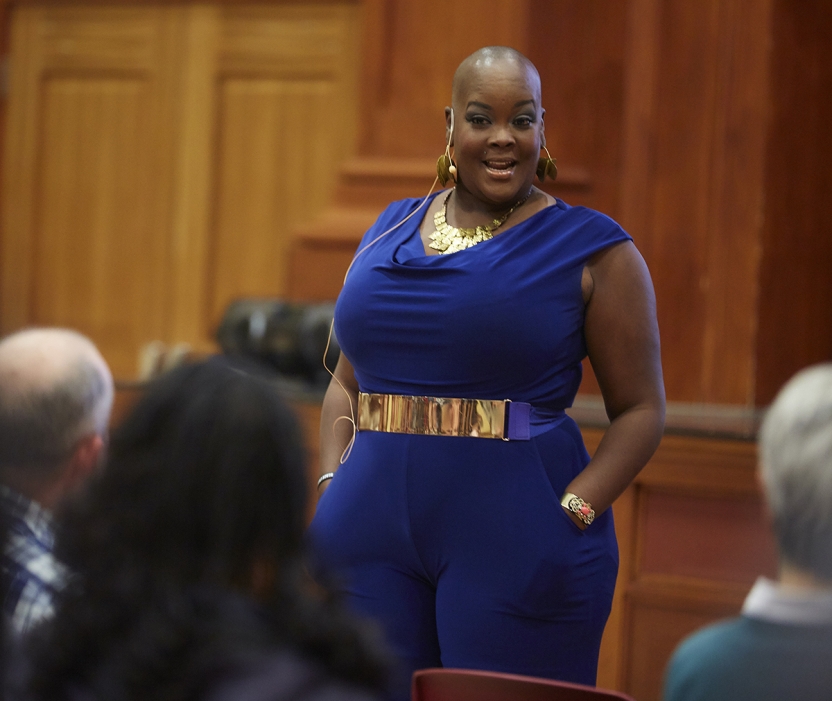Speaker Says ‘Radical Body Love’ Can Spark Social Transformation

MIDDLEBURY, Vt. – It started with a Facebook picture—nothing more, nothing less.
When Sonya Renee Taylor posted a photograph of herself to the social media site, she didn’t intend to start a movement, or a company. She simply wanted to share a photograph in which she felt beautiful, and empowered—stretch marks, “terrible tattoo,” and all.
That photograph was the seed that sparked “The Body Is Not an Apology,” the movement Taylor—a noted author, educator, spoken-word poet, and activist—now heads. At first, she simply prompted a few other friends to share similarly empowering photographs, but soon the idea spread. Taylor lent the name of one of her poems, “The Body Is Not an Apology,” to the project and set up a Facebook group. The group grew—to 20, 200, 2,000, 50,000.
Founded in 2011, “The Body Is Not an Apology” is now a digital media platform that reaches 250,000 people in 140 countries every week.
That project—and more broadly, the goal to use radical body love as the spark for social transformation—was the topic of Taylor’s January 13 lecture at Wilson Hall. The keynote speaker for the Alumni of Color Weekend and Martin Luther King Jr. celebration, Taylor spoke about her work promoting “radical self love” in the service of activism and social justice.
In sparking a self love movement, Taylor said she discovered that “the world is actually really exhausted of hating itself.”
This isn’t a navel-gazing exercise designed simply to make individuals feel better in their own skin. Structures of oppression are borne out of a sense of deficiency, said Taylor. Radical, unapologetic self love can be a tool, Taylor said, in service toward a more just, equitable, and loving world.
The message came with added relevance on the cusp of Martin Luther King Jr. Day.
“We cannot transform anything in the world that we have not transformed in ourselves,” said Taylor.
She also challenged the audience to think critically about the agenda promoting self hate. U.S. advertisers spend roughly $400 billion annually targeting consumers across all categories. Beauty spending alone—on items like makeup, gym memberships, and hair products—totals roughly $500 billion worldwide. The problem isn’t merely one of money, she said, but also of energy and attention.
“There’s a reason we’re distracted. There is a reason that we are systems of self-loathing, that we are in the belief that we’re deficient. It actually makes us very pliable consumers, and people who don’t usually get up and burn down the streets,” said Taylor.
In the question-and-answer period following her talk, a student raised her hand and asked Taylor what she considered to be the difference between “radical” self love and “normal” self love. Taylor turned the question around: “What do you consider normal self love?”
The student paused, then answered, “Accepting yourself, while also realizing that you can be better, and pursuing growth.”
“And do you feel we live in a world that makes that easy to do?” asked Taylor.
“No,” came the answer.
“That’s why it’s radical,” said Taylor. “I want a radical self love that changes our society, that changes the way that our economy works, that changes the way our political sector works, that changes the way we move through the world.”
By Kathryn Flagg ’08; Photo by Yeager Anderson ’13.5

